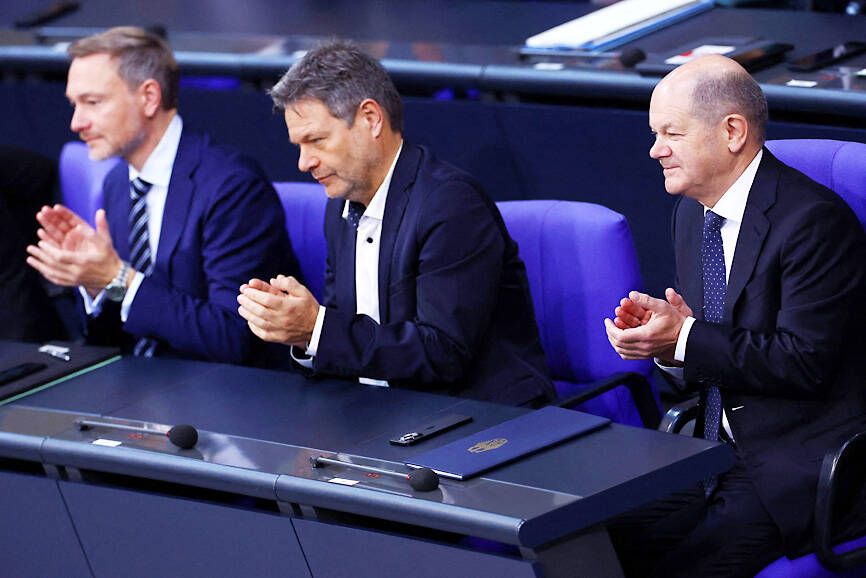German Chancellor Olaf Scholz and German Minister for Economic Affairs and Climate Action Robert Habeck have promised to solve investment subsidy issues for Taiwan Semiconductor Manufacturing Co (TSMC, 台積電) and Intel Corp, despite the country’s budget woes.
Uncertainty over the funding to TSMC and Intel has arisen after a ruling by the German Federal Constitutional Court, which cast doubt over subsidies for construction of local semiconductor chip plants.
On Nov. 15, the court ruled that the German government’s decision last year to reallocate 60 billion euros (US$65.74 billion) of unused funding from COVID-19 pandemic support measures to its Climate and Transformation Fund was unconstitutional.

Photo: Reuters
Some of the money was designated to go to subsidies in support of investments by companies such as TSMC and Intel in Germany.
The ruling has raised questions over whether the federal government would be able to deliver on its subsidy promises.
TSMC, the world’s largest contract chipmaker, is planning to set up a joint venture to build a semiconductor fab in Dresden, Saxony.
It would have a 70 percent stake in the joint venture, called European Semiconductor Manufacturing Co, with investment partners Bosch GmbH, Infineon Technologies AG and NXP Semiconductors NV expected to each hold a 10 percent stake.
US chip giant Intel is planning to build a wafer fab in Magdeburg, Saxony-Anhalt.
Berlin has promised 5 billion euros in subsidies to TSMC, which with its partners is expected to invest a total of 10 billion euros in the new plant, while Intel has been promised 9.9 billion euros for its 30 billion euro investment.
Saxony-Anhalt Minister President Reiner Haseloff on Monday said that Scholz spoke by telephone with him and Saxony Minister President Michael Kretschmer to express his strong support for the TSMC and Intel projects, and pledged to do his best to bring them to fruition.
“We have faith in the chancellor’s promises,” Haseloff said.
Habeck said that he would try hard to find a solution to provide funding under the law to TSMC and Intel after he met with the state leaders.
Habeck said that the investments are “the core of Germany’s economy” and there is no doubt that they need to be realized.
TSMC is hoping to break ground on the fab in Dresden in the second half of next year. Mass production would start at the end of 2027 and use 12, 16, 22 and 28-nanometer processes to produce chips for automotive electronics and specialty industrial devices.
The plant would be TSMC’s first chip foundry in Europe.
The chipmaker is also building two fabs in Arizona and another in Kumamoto, Japan.

In Italy’s storied gold-making hubs, jewelers are reworking their designs to trim gold content as they race to blunt the effect of record prices and appeal to shoppers watching their budgets. Gold prices hit a record high on Thursday, surging near US$5,600 an ounce, more than double a year ago as geopolitical concerns and jitters over trade pushed investors toward the safe-haven asset. The rally is putting undue pressure on small artisans as they face mounting demands from customers, including international brands, to produce cheaper items, from signature pieces to wedding rings, according to interviews with four independent jewelers in Italy’s main

Macronix International Co (旺宏), the world’s biggest NOR flash memory supplier, yesterday said it would spend NT$22 billion (US$699.1 million) on capacity expansion this year to increase its production of mid-to-low-density memory chips as the world’s major memorychip suppliers are phasing out the market. The company said its planned capital expenditures are about 11 times higher than the NT$1.8 billion it spent on new facilities and equipment last year. A majority of this year’s outlay would be allocated to step up capacity of multi-level cell (MLC) NAND flash memory chips, which are used in embedded multimedia cards (eMMC), a managed

Japanese Prime Minister Sanae Takaichi has talked up the benefits of a weaker yen in a campaign speech, adopting a tone at odds with her finance ministry, which has refused to rule out any options to counter excessive foreign exchange volatility. Takaichi later softened her stance, saying she did not have a preference for the yen’s direction. “People say the weak yen is bad right now, but for export industries, it’s a major opportunity,” Takaichi said on Saturday at a rally for Liberal Democratic Party candidate Daishiro Yamagiwa in Kanagawa Prefecture ahead of a snap election on Sunday. “Whether it’s selling food or

In the wake of strong global demand for AI applications, Taiwan’s export-oriented economy accelerated with the composite index of economic indicators flashing the first “red” light in December for one year, indicating the economy is in booming mode, the National Development Council (NDC) said yesterday. Moreover, the index of leading indicators, which gauges the potential state of the economy over the next six months, also moved higher in December amid growing optimism over the outlook, the NDC said. In December, the index of economic indicators rose one point from a month earlier to 38, at the lower end of the “red” light.